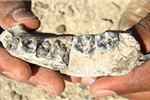 KAYE REEDScientists from the University of Nevada and their colleagues have unearthed a fossilized mandible and teeth of a 2.75 million- to 2.8 million-year-old hominin, thought to be among the earliest Homo species. Their analysis of the specimen, discovered in Ethiopia two years ago, was published in Science this week (March 4).
KAYE REEDScientists from the University of Nevada and their colleagues have unearthed a fossilized mandible and teeth of a 2.75 million- to 2.8 million-year-old hominin, thought to be among the earliest Homo species. Their analysis of the specimen, discovered in Ethiopia two years ago, was published in Science this week (March 4).
“It is a remarkable new fossil discovery from a really poorly understood timeframe in human evolutionary history,” said biological anthropologist Darryl de Ruiter of Texas A&M University who was not involved in the research. Previously, “the earliest really reliable fossil evidence we had for the appearance of Homo was about 2 million years old,” he added.
 G. PYRGIOTAKIS ET AL.A team led by investigators at Harvard has developed an approach—using water nanostructures in an electrospray—to kill foodborne microbes. They described the new method in Environmental Science & Technology last month (February 19).
G. PYRGIOTAKIS ET AL.A team led by investigators at Harvard has developed an approach—using water nanostructures in an electrospray—to kill foodborne microbes. They described the new method in Environmental Science & Technology last month (February 19).
Hongda Chen, acting deputy director at the US Department of Agriculture’s National Institute of Food and Agriculture who was not involved in the work told The Scientist that “using nanoscale water droplets to inactivate pathogenic bacteria is an innovative approach, and these early results ...


















